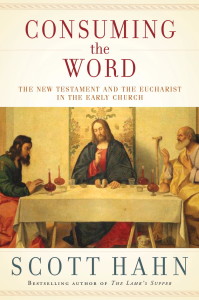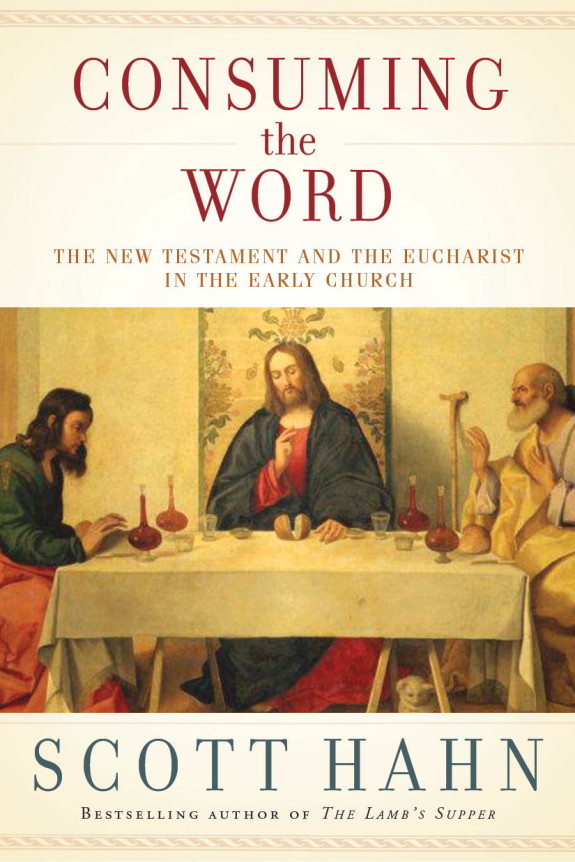Consuming the Word: The New Testament and The Eucharist in the Early Church
by Dr. Scott Hahn
Image, 176 pages, hardcover
Released on May 28, 2013
If you walked into a first-century church and asked to see a copy of the New Testament, you’d get a bunch of confused looks. What do you mean a copy? The Bible didn’t exist yet. For the early Christians, “New Testament” was a sacramental phrase. It wasn’t a book; it was the Eucharist.
 In Consuming the Word: The New Testament and the Eucharist in the Early Church (Image, 2013), renowned scholar Dr. Scott Hahn explains that for the biblical writers, the words “testament” and “covenant” were interchangeable. Both the Greek word for “testament” (diatheke) and the Hebrew equivalent (b’rith) are most accurately rendered in English as “covenant.” Therefore when Jesus offered a cup of wine to his disciples at the Last Supper, saying “this cup is the new covenant [kaine diatheke] in my blood” (1 Corinthians 11:25), the Jews would have understood him to say, “this cup is the new testament in my blood.” Thus the New Testament was a sacrament at least a generation before it was a document.
In Consuming the Word: The New Testament and the Eucharist in the Early Church (Image, 2013), renowned scholar Dr. Scott Hahn explains that for the biblical writers, the words “testament” and “covenant” were interchangeable. Both the Greek word for “testament” (diatheke) and the Hebrew equivalent (b’rith) are most accurately rendered in English as “covenant.” Therefore when Jesus offered a cup of wine to his disciples at the Last Supper, saying “this cup is the new covenant [kaine diatheke] in my blood” (1 Corinthians 11:25), the Jews would have understood him to say, “this cup is the new testament in my blood.” Thus the New Testament was a sacrament at least a generation before it was a document.
But why is that important? It reveals the deep connection between the New Testament books and the New Covenant liturgy. These biblical documents were intended to be proclaimed within the context of the sacrament. Unlike many Protestants, who focus exclusively on the Scriptures, Catholics dine at two tables. As Pope John Paul II described them, “one of the Word of God, the other of the Eucharist. The work that we take on ourselves consists in approaching these two tables in order to be filled.” Hahn’s book offers many fascinating insights on this connection.
Some readers may find Consuming the Word uncharacteristically disjointed. The chapters don’t move with the same linear, directed focus of titles like The Lamb’s Supper or Hail, Holy Queen. Instead, the book reads more like a collection of related, but disconnected essays. Also, readers might find the title a bit deceptive. The book isn’t so much concerned with the New Testament canon, or the development of Eucharistic theology, but with Christian semantics and the Bible’s liturgical context.
Nevertheless, Consuming the Word effectively argues that to understand Christianity, we must know it’s most basic terms—and know them as the early Christians did. For them, the phrase “New Testament” was at once sacramental and biblical. It affirmed that the Bible’s proper home was in “the heart of the Church.” Therefore today, we must follow them by communing with Christ, the Word of God, through both letter and Spirit.

